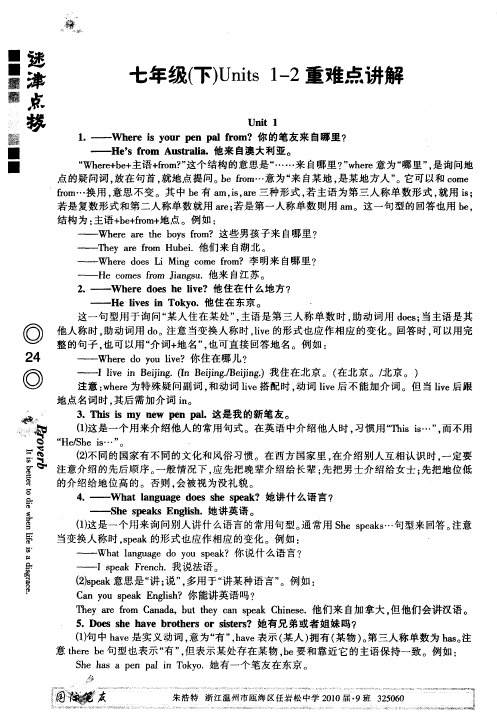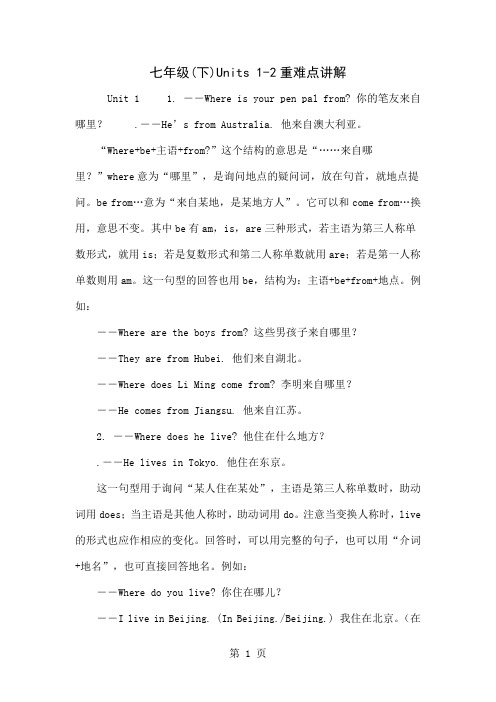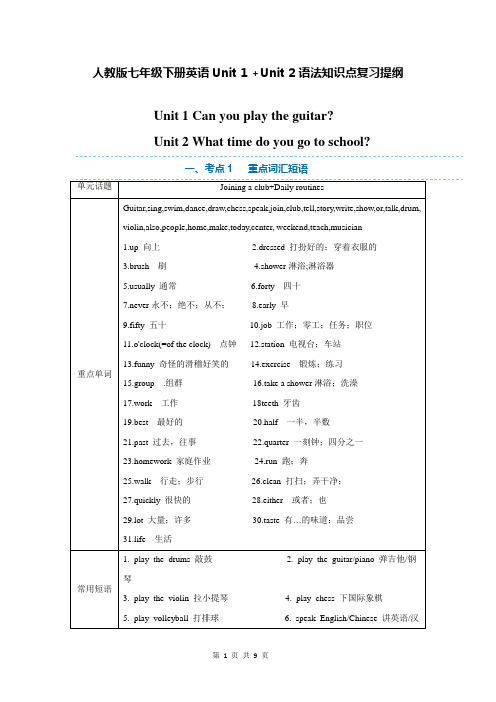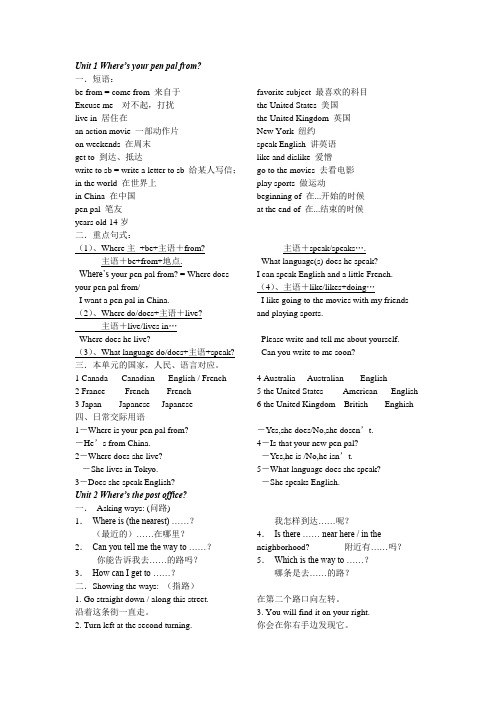七年级(下)Units 1-2语法天地
- 格式:doc
- 大小:71.50 KB
- 文档页数:10

英语七年级下册第一到九单元综合语法1. Unit 1-2: Present Simple Tense- Form: Subject + verb (infinitive) + s/es- Use: Used to talk about habits, routines, general truths, and statements about the present- Example: I walk to school every day.2. Unit 3: Question Words- What, where, when, why, how, who, which, whose- Use: Used to ask for specific information- Example: What is your name?3. Unit 4: Comparative and Superlative Adjectives- Comparative: more + adjective OR -er + adjective- Superlative: most + adjective OR -est + adjective- Use: Used to compare objects or people- Example: He is taller than me.4. Unit 5: Imperatives- Form: Verb (infinitive)- Use: Used to give commands or requests- Example: Turn off the light.5. Unit 6-7: Present Continuous Tense- Form: Subject + to be (am/is/are) + verb (gerund) + ing- Use: Used to talk about actions happening now or in the near future- Example: She is watching TV right now.6. Unit 8: Possessive Adjectives and Pronouns- Possessive Adjectives: my, your, his, her, its, our, their- Possessive Pronouns: mine, yours, his, hers, its, ours, theirs- Use: Used to show ownership- Example: This is my book.7. Unit 9: Past Simple Tense- Form: Regular verb + ed OR irregular verb- Use: Used to talk about actions or states that happened and ended in the past- Example: I went to the park yesterday.。


七年级(下)Units 1-2重难点讲解Unit 1 1. ――Where is your pen pal from? 你的笔友来自哪里?.――He’s from Australia. 他来自澳大利亚。
“Where+be+主语+from?”这个结构的意思是“……来自哪里?”where意为“哪里”,是询问地点的疑问词,放在句首,就地点提问。
be from…意为“来自某地,是某地方人”。
它可以和come from…换用,意思不变。
其中be有am,is,are三种形式,若主语为第三人称单数形式,就用is;若是复数形式和第二人称单数就用are;若是第一人称单数则用am。
这一句型的回答也用be,结构为:主语+be+from+地点。
例如:――Where are the boys from? 这些男孩子来自哪里?――They are from Hubei. 他们来自湖北。
――Where does Li Ming come from? 李明来自哪里?――He comes from Jiangsu. 他来自江苏。
2. ――Where does he live?他住在什么地方?.――He lives in Tokyo. 他住在东京。
这一句型用于询问“某人住在某处”,主语是第三人称单数时,助动词用does;当主语是其他人称时,助动词用do。
注意当变换人称时,live 的形式也应作相应的变化。
回答时,可以用完整的句子,也可以用“介词+地名”,也可直接回答地名。
例如:――Where do you live? 你住在哪儿?――I live in Beijing. (In Beijing./Beijing.) 我住在北京。
(在北京。
/北京。
)注意:where为特殊疑问副词,和动词live搭配时,动词live后不能加介词。
但当live后跟地点名词时,其后需加介词in。
3. This is my new pen pal. 这是我的新笔友。

暑假复习——7B U1-2基础知识汇总知识点U11. would like to do sth.相当于want to do sth.,用来征求意见、提出建议或发出邀请。
I would like something to eat.I would like you to go on a picnic with me.Would you like to drink some coffee?肯定回答: Yes, I'd love/ like to. 或 Sure, that sounds great. 或 Yes, please.否定回答: No, thanks. 或 Sorry. I'm afraid not.或I'd love/like to but...2. next to=close to=beside 在...在在在在在3. there be句型,谓语动词就近原则表示有事情要做,用there be sth to do。
There are lots of things ___________(see) in Beijing..表示有某人正在做某事,用there be sb doing sth.。
On game shows, there are always famous people___________(talk) about their lives.4. 在在one在it(1)one 在在泛泛在在在在在在在在在在在在在在I can't find my hat. I think I must buy a new one.(2)it 在在泛泛在在在在在在在在在在在在在在I can't find my hat. I don't know where I put it.5. 最高级的构成及用法单音节词和少数双音节词:①一般在词尾加-est(longest, tallest);②以字母-e结尾的词,加-st(largest, nicest);③以“辅音字母+y”结尾的词, 变y为i,再加-est(busiest, heaviest);④重读闭音节词只有一个辅音字母结尾时,先双写辅音字母,再加-est(biggest, hottest)。

人教版七年级下册英语Unit 1 +Unit 2语法知识点复习提纲Unit 1 Can you play the guitar?Unit 2 What time do you go to school?一、考点1 重点词汇短语二、考点知识梳理(一)重点词汇1、I want to join the art club.我想加入美术俱乐部。
(1)want 动词,意为“想;想要”;固定搭配:want to do sth 想要做某事◆I want to watch TV.(2)join v. 参加,加入它是短暂性动词,不能和一段时间连用,后加组织名称或人称代词。
◆I want to join the army.拓展:辨析:join与join in1)join 加入某些人中、加入某党派、组织或者社团,成为其中的一员◆Come and join us. 来加入到我们中吧。
2)join in 表示参加正在进行着的、小规模的活动,如比赛、游戏等;◆She likes to join us in the game. 她喜欢加入到我们的游戏中。
2、Can you draw?can 的用法◆can为情态动词,意为“能,会”,表示能力。
◆应用注意事项:(1)没有人称和数的变化;(2)接动词时后面只能接动词原形;She can sing that song in English. 她能用英文唱那首歌。
(3)Can引导的疑问句可以用来询问对方是否有做某事的能力;Can you sing? 你能唱歌吗?(4)情态动词can的肯定句变否定句在can 后加not,can’tI can speak English. → I can’t speak English.(5)can 放于句首,构成一般疑问句。
若问句询问能力,可以回答:Yes, … can. 或No, … can’t.---Can she dance? --Yes, she can. / No, she can’t.3、What about you ?你呢?(1)表示你呢时=and you?(2)what about 后接动词ing形式、代词或名词◆What about playing basketball after class?拓展:What about…? 意为……怎么样?与how about 同义常用于询问消息,征求意见或建议,about后可以跟名词,代词或动词ing形式◆I want to walk to school. What/How about you? 我想步行去学校,你呢?4、You are very good at telling stories.你很擅长讲故事。

Unit 1 Where’s your pen pal from?一.短语:be from = come from 来自于Excuse me 对不起,打扰live in 居住在an action movie 一部动作片on weekends 在周末get to 到达、抵达write to sb = write a letter to sb 给某人写信;in the world 在世界上in China 在中国pen pal 笔友years old 14岁favorite subject 最喜欢的科目the United States 美国the United Kingdom 英国New York 纽约speak English 讲英语like and dislike 爱憎go to the movies 去看电影play sports 做运动beginning of 在...开始的时候at the end of 在...结束的时候二.重点句式:(1)、Where主+be+主语+from?主语+be+from+地点.Where’s your pen pal from? = Where does your pen pal from/I want a pen pal in China.(2)、Where do/does+主语+live?主语+live/lives in…Where does he live?(3)、What language do/does+主语+speak?主语+speak/speaks….What language(s) does he speak?I can speak English and a little French. (4)、主语+like/likes+doing…I like going to the movies with my friends and playing sports.Please write and tell me about yourself. Can you write to me soon?三.本单元的国家,人民、语言对应。
七年级下册中考语法考点突破★★Book 1下Unit 1- 2—unit 3 -4〖考点58 〗语法训练情态动词情态动词can may, must, could ,would, should, might.1.can 能.会无人称变化.后加动词原形I(we you they he she ) can speak English?2.变否定句; 在can后加not 不能:can not cannot can’tHe can’t play the guitar3.变疑问句及回答: ① Can you play the piano? Yes, I can /No, I can’t但②Must I………?No, you needn’t.但③May I……….?No, you must n’t.4.表判断:肯定:must be. 否定:can’t be. 可能性:may be ,/might be.〖考点59 〗:-祈使句<一>.概念:表示请求,命令,劝告,邀请。
1.无主语,以动词原形开头。
2.句型一:Let’s go!句型二:Get up early句型三:Don’t be late for school。
3.否定句在句首+ Don’t;Let’s not sing in class!4.表警示的祈使句:No+ ing; No talking!No+名词:No photos5.反意疑问句:①Let’s……..,shall we?②其余都用 ....,will you?〖考点60 〗语言目标:Unit 1 ◆典句必背1. _____________你会游泳吗? Yes, I can. / No, I can’t.2. _____________________你想加入什么俱乐部?I want to join the chess club.3. Sounds good./______________________. 听起来不错4. I can speak English and I can also play soccer.5.What can you do?问能力I can dance./ I can’t sing.〖考点61 〗语言目标:◆典句必背 Unit 2 ◆典句必背1.___________________________你常几点钟起床?I usually get up at six thirty.2. That’s a funny time ___________________!那个时候吃早餐真有意思3._______ do students usually eat dinner?什么时候They usually eat dinner __________________在七点差一刻in the evening.4. In the evening, I ____________watch TV ______ play computer games.或者…或者〖考点62 〗语言目标:◆典句必背 Unit 3 ◆典句必背1. _______怎样do you get to school? I ride my bike./by bike/by bus2. ___________多远is it from your home to school? It is five kilometers3. ___________多长时间does it take you to get to school?It takes me five minutes to get to school4. For many students, it is ___________________________到达学校容易.5. There is a very big river__________ their school _______the village.在…之间6.He’s___________________________他像一个父亲一样待我7.________ do you think of the trip? It is great.〖考点63 〗◆◆中考词汇拓展1.sing(n,歌手):_________2.story(复数)_________3.people(复数)_________4.teach(n.名词)_________5.music(音乐家)_________6.swim(现在分词)_______7.piano(复数)_________ 8.make (过去式)_________9; tooth(复数)__________ 10; half(复数)_________11; life(复数)__________ 12; fun(形容词)_________13; brush(复数)________ 14; quick(副词)________15; radio(复数)_________ 16;run(现在分词)______17; down(反义词)_____ 18. cross(名词)_______19:village(名词)________ 20.drive(名词)________21. bus(复数)_________ 22.new(反义词)_________23. far(反义词)________ 24.leave(过去式)________25.stop(过去式)________ 26. nine(序数词)________27.too(否定形式)________ 28.:wear(过去式)______29.fight(过去式)_______ 30.dish(复数)________31.quiet(副词)________ 32.noise(形容词)_______33.important(名词)_____ 34.relax(单数)_______35.luck(形容词)_____ 36.learn(名词)_____〖考点64 〗:and / but / or的区别1.and和..表顺接.用于肯定句I like sing and dance2.but 但是表示转折He likes art but he does likes music3.or还是; .用于否定句.选择疑问中.否则=if not如果..不I can’t sing or dance. Can you sing or dance?Get up early .or you will be late for class4.音乐名词前加the;play the guitar. 球类名词前不加the. 下棋play chess5..job/ work 工作 job:可数名词.一件工作 a job work不可数名词6.here .there. home前要省toget there到达那儿.get home.到家go there去哪儿. go home回家come here来这7. 英语钟点时刻的表达方式①釆用数词表达时间;6;30---six thirty 8;15......eight fifteen9:55---nine fifty-five②釆用介词past, to表达时间: 半小时内用past8:15----a quarter past three 6;30-----half past six 半小时过后用;to 差几分到几点8;45-----a quarter to nine8.频率副词; -----------常放在be后.助动词后; 实义动词前:always,一直,总是;usually通常,often经常,常常;sometimes有时,never从来没有He is often late for school She never gets up early9 .live居住(不及物动词) He lives in Beijing 但要用on the farm居在农场 on the second floor居在第二层10你会用how吗?1.问身体情况;how2.交通方式:how3.问距离:how far4.问时间长短how long5.问频率:how often6.问价格:how much7.问年龄:how old 8.问数量多少:how many /,how much11 there is /there are-某处有------与have .has某人有1.There is a book on the desk2.There are some books on the desk3.I have an apple4.Tom has a car12. 合成形容词1.A n 11-year-old boy 2.ten-minutes’ walk3. a two-day trip4.no bridge ==not a bridge13 .划线部分是交通方式:用how 1.take the bus ; 2.by bike/ busHow do you get to school?I take a bus . I go to school by bus14 . there is ( are) / /have ( has ) 有的区别;某处有:there is ( are) 某人有:have ( has )① there be sb doing sth.有人在做某事②have difficulty doing sth做某事有困难.15.speak, tell, talk,// say.16. hundred, ,thousand, million的用法17.stop// stop to do sth. //stop doing sth.18, 11-year-old boy. / / 11-year-olds // 11 years old19.how,/ how far / how long. / how often / how soon.20. help sb. (to) do sth. 帮助某人做某事21. be strict with sb. 对某人要求严格22. learn to do sth. 学会做某事23. practice doing sth. 练习做某事24. let sb. do sth.让某人做某事25. be friendly to sb.对某人友好◆中考完形填空。
7B语法练习(Unit 1-2)1.Her flat in Shanghai is different from _________(you) in Nanjing in some ways.2.Your answer is wrong, you have to do it a _________(two) time.3. ─ What's your sister’s dream?─ She wants to be a film star when she _________(grow) up.4.--Would you like to play basket with me?--Yes, I’d love to, but I should finish _________(do) my homework first.5 Her family is a large one. The whole family_________ (watch) TV at the moment.6.We all hope you_________ (visit) the Summer Palace with us next week.7.Our teacher _________(say) that the visitors will arrive at; our school tomorrow afternoon.8.The number of the students in our school is about six hundred,and two _________(three) of them are girls.9. ─What is your brother doing?─He _________ (look) at the flowers through the window.10. Please _________(be) quiet. The children are having a class now.11.If you aren’t careful, you _________(not pass) tomorrow's English test.12. There__________(be)two basketball matches on TV this evening, aren't there?13.Would you please_________ (not be) late for school any more, Tom?14.________each of the students ________ (read) English at the moment?15.My father always fixs his car by________ (him) if it is possible16.-Where is your father, Jimmy?-He is waiting for the football match. It_________ (start) at 7:00.17.一How soon _________ your father_________ (come) back?一In two days.18.The Smiths _________(live) in a flat in City Garden m Ninth Street next year.19.一Does he know when he ______(leave) Shanghai?一Yes, next Monday.20. Would you like (go) swimming with me this afternoon?21.I think the police _________(have)a meeting in the room at the moment.22. Millie,______(not come) late tomorrow. We'll go on a visit to the museum.23. Millie spends as much time as she can _________ (speak) English every day.24. --There isn't anything to eat in the fridge.--I know. But there are too many people_________(shop) in the supermarket.25.My father works in one of the biggest _________ (company) in the world.26.More than half a million visitors_________(come) to our city this May Day.27. It_________ (take) 2 hours to go from Wuxi to Hangzhou by train in two years.28. It's7p.m. My cousin with his parents _________ ( enjoy) his birthday dinner.29. Why not join an English Club to practice______(speak)?30. I hope everyone_______(have) a wonderful time at the party tomorrow evening.31. Last week, these___________(fireman) quickly put out the big fire.32.My friends want me to go out with them, but my mother__________ (tell) me to stay at home.33._________________(fix) such a big machine is not an easy job.We need more time, sir.34.Her mother is very busy in China and seldom__________(fly) back to England.35.―Jenny,would you like to come to the party at my new home tomorrow evening?—I'd love to, but I am not free. I ___________(fly)to Hong Kong tomorrow morning.36.We should do what we can_________ (make) the world a better place for you and me.37.Be careful! A big black dog ________(lie) in front of our car.38. Father often tells me _______(not play) football on the road.39.We planted _________(thousand) of trees last year. Two hundred of them are in the park.40. My cousin with her family ________(spend) their holiday in Hainan in threedays.41. There is still a cake left. Let's ________(share) it.42. Each of us is looking forward to ________(get) a good result. Let's do it more carefully.43. I don't need (some) help with the work. It's quite easy for me. But thank you all the same.44. Why not ________(invite) your new friends to your home for dinner?45.In winter, we can make a fire (keep) the room warm.46. Do you always wash your hands before____________(have) meals?47. People in the community are like a big family. They are all (help) and kind.48. Like her father, my cousin likes (share) his things with others.49.What a wonderful time she has__________(play) tennis with her family!50.Don't make your parents _________(worry) about you so often.51. There is a sick boy in hospital. The doctor will make him _________(feel) better.52. My sister is very helpful. She is ready_____________(help) others any time.53. Hong Kong is a wonderful place________(visit). A lot of travelers go there every year.54.May I make a call on your mobile? Mine is (break).55.Would you please ________ (help)me with the supper this evening, my son?56. We are sure that every___________ (visit) will be happy with the works in the art centre.57. After a hard ___________(day) work, My mother is very tired. Now, she is lying in bed.58. I hope we______ (have)a car of our own in the future.59.We all think that we are _____________(luck) enough to live a happy life like this.60. Can you ask your friend__________(not be) late for the online school?61.—What do you think of _________(eat) in KFC again?—Why not make a change?Fast food is bad for our health.62. ---Does it take your mother twenty minutes to go to work by car every day?--No, She spends an hour________(walk) there every day. It's good for her health.63.What about__________(check)all the students’ names on the list?64. You __________ (not need) to go far if you need help because of the community center beside.65.Thank you for_________(let) me know something new about the plan.参考答案:1.yours2. second3. grow4.doing5. are watching6.will visit7. says8.thirds9. is looking 10. be11. won't pass 12. are going to be 13. not be 14. Is reading 15. himself 16. will start 17. will come 18. will live 19. will leave 20. to go 21.is having 22. don’t come 23. speaking 24. shopping 25. companies 26. will come 27. will take 28. is enjoying 29.speaking 30. will have 31. firemen 32. tells 33. Fixing 34. flies 35. am flying 36.to make 37. is lying 38. not to play 39. thousands 40. will spend 41. share 42. getting 43. any 44. invite 45. to keep 46. having 47. helpful 48. sharing 49. playing 50. worry 51. feel 52.to help 53.to visit 54.broken 55.help 56. visitor 57. day's 58. will have 59. lucky 60. not to be 61. eating 62. walking 63. checking 64. don't need 65. letting。
七年级下册m1u2英语知识点第一部分:常用问候语1. 问候语的作用:传递友好,缩短距离。
2. 常用的问候语有:* Good morning/afternoon/evening。
* How are you?* What’s up?* Hi/Hey/Hello.3. 回答问候语的方法:* Fine, thank you.* I’m good, thanks.* Not bad.* Great/Good/OK.第二部分:人称代词1. 人称代词分为主格和宾格,常见的有:* 主格:I, you, he, she, it, we, they* 宾格:me, you, him, her, it, us, them2. 主格在句子中作主语,宾格在句子中作宾语。
3. 注意不定式的使用:* 当不定式做主语或宾语时,使用宾格形式。
第三部分:现在进行时1. 现在进行时表示现在正在发生的动作,构成方式为“be + 动词的现在分词”。
2. 常见的时间状语有:* now* right now* at the moment* currently3. 特殊情况下,现在进行时的构成方式可能会有变化:* 单音节动词和部分双音节动词,词尾需要双写。
* 以“e”结尾的动词,需去掉“e”再加上-ing。
第四部分:形容词的比较级和最高级1. 形容词的比较级表示两者之间的比较,构成方式为“more +形容词”。
2. 形容词的最高级表示三者或三者以上之间的比较,构成方式为“the + 形容词 + -est”。
3. 特殊情况:* 以“y”结尾且前面是辅音字母的形容词,需变“y”为“i”再加“-est”。
* 部分不规则变化的形容词在比较级和最高级形式都有变化。
第五部分:易混淆动词1. raise和rise* raise表示举起,提高的意思,常用于及物动词。
* rise表示升起,上升的意思,不带宾语,常用于不及物动词。
2. borrow和lend* borrow表示借入,常用于主动语态。
Unit 1 知识点总结短语归纳play chess 下国际象棋play the guitar 弹吉他speak English 说英语English speaking club 英语俱乐部the swimming club 游泳俱乐部the story telling club 讲故事俱乐部talk to 跟…说play the violin 拉小提琴play the piano 弹钢琴play the drums 敲鼓make friends 结交朋友do (Chinese) kung fu 会(中国)功夫tell stories/tell a story 讲故事write storie 写故事play games (with sb) 做游戏on the weekends (在)周末单词用法总结1 play +棋类/球类下……棋,打……球play the +西洋乐器弹/拉……乐器2 be good at sth/doing sth.= do well in sth/doing sth. 擅长做某事be good with sb. 善于与某人相处be good to=be friendly to 对…友好的be good for 对…有益的(be bad for 对…有害的)3 need sb. to do sth. 需要某人做某事4 want to do sth 想要做某事5 show sb sth = show sth to sb 展示某物给某人6 a little + 不可数名词一点儿……only a little的意思是“仅仅一点”,表示肯定的意思,little是表示否定的意思,它的意思是“很少、几乎没有”。
7 join是参加、加入的意思,它表示加入某个组织并成为其中的一个成员。
join the …club 加入…俱乐部jion sb 加入某人8 like doing sth 喜欢做某事(经常性、习惯性的)like to do sth. = love to do sth. 喜欢/喜爱做某事(偶然性的)现在两者区别不大9 help sb with sth就某事帮助某人= help sb(to)do sthCan you help kids with swimming?10 speak 后面常跟说的语言tell sb sth 告诉某人某事tell sb (not) to do sth 告诉某人(不)去做某事say强调说的内容talk to/with 与…某人谈话talk about sth 谈论某事11 on time 准时in time 及时12 what about = how about …怎么样后面常跟人称代词、名词,还有动名词(doing)13 let’ s= let us + do 让我们去做某事语法总结一Can you play the guitar?你会弹吉他吗?can 的用法,意思是能、会,表示某人具有做某事的能力1 can 为情态动词,没有人称的变化,后面必须用词原形2 can 的否定句是在can的后面直接加not(cannot/can not),也可以缩写为can’t3 can 的一般疑问句是把can放在句子的开头并且大写, 对can 的回答通常是Yes, 主语+can/ No, 主语+can’t(主语则是用什么问就用什么答)二What club do you want to join? -I want to join the art club.你想加入什么俱乐部?我想加入艺术俱乐部。
七年级(下)Units1-2语法天地一般现在时的自述同学们好!我叫一般现在时,在时态家族中,我是老大哥。
在英语中,我的应用最广泛,是你们学习英语语法的重点。
一、如果同学们想要找我,请到下面三个地方去找:1)经常性、习惯性的动作或存在的状态。
eg:I go to school on foot. 我步行去上学。
He is very busy now. 他现在非常忙。
2)表示主语的特征、性格、能力、爱好等。
eg:He can swim. 他会游泳。
I like watching TV. 我喜欢看电视。
3)表示客观真理。
eg:There are seven days in a week. 一周有七天。
The moon moves round the earth. 月亮绕着地球转。
二、我的结构按正常语序,也就是“主语+谓语+其它”,有时为了起强调作用,我常常把时间状语提到前面。
我的句式变化可分为两种情况:1)表示动作,一般人称作主语的,变否定句时须在动词前面加助动词don’t;变一般疑问句时须在句首加助动词do。
eg:They have lunch at 12:00.→They don’t have lunch at 12:00.Do they have lunch at 12:00?2)第三人称单数作主语的,变否定句时须在动词前面加助动词doesn’t,动词恢复原形;变一般疑问句时须在句首加助动词does,动词恢复原形。
eg:Jenny speaks English very well.→Jenny doesn’t speak English very well.Does Jenny speak English very well?3)含有be动词的要在be上做变化。
eg:Danny is a good student.→Danny isn’t a good student.Is Danny a good student?三、我的时间状语多为often,usually,always,sometimes等频率副词,on Saturdays,in the morning(afternoon evening),every day等。
四、有些同学在和我交朋友时,总是犯这样或那样的错误,现以用括号中所给词的适当形式填空题型为例,进行一一说明。
eg:1)be动词与行为动词同时出现在句子中例:We are plant(plant) the trees in spring.答案:plant解析:学生往往会用汉语的思维方式去翻译,就成了“我们是在春天植树”。
这是学习英语最忌讳的,要看语法是不是正确,在英语中,be表状态,do表动作,两种动词不能同时出现在句子中,可记住如下口诀:“英汉语言有差异,be、do不能放一起,仔细琢磨细分析,语法千万要牢记。
”2)单三人称形式易出错例:1. He plaies(play) football very well.2. Danny gos(go) to school at 7:10.答案:1.plays 2.goes解析:1.以辅音字母加y结尾的动词变单三人称形式才能把y换成i再加-es;2.与名词变复数不同,变单三人称形式以o结尾的词要加-es。
3)在句式变换时易出错例:1. Does Jenny has(has) a good friend?2. Brian doesn’t lives(not live) in China.答案:1.Does;have 2.doesn’t live解析:单三人称作主语的一般现在时作句式变化时,可记住如下口诀:“见助动,用原形”。
此口诀也可推广用于一般过去时态中。
eg:He didn’t go home yesterday.4)对do的理解易出错例:We don’t(not do) our homework in the afternoon.答案:don’t do解析:do是一个比较难理解的词,它有三个含义: a)是所有行为动词的总称;b)是助动词,无实际意义;c)是一个具体的行为动词,意为“做,干”。
此句中给出的do指“做,干”,not指把此句变为否定句,故须在do前加助动词don’t。
5)对主语的数的判断有误例:Li Ming with me are(be) in Beijing.答案: is解析:从表面看是“我和李明两个人在北京”,但with在此作伴随状语,不能作主语,故用is。
另外,宾语从句中,从句部分若是表示客观真理,不管主句是何时态,从句都要用一般现在时;在时间和条件状语从句中,主句表将来,从句要用一般现在时。
【小试牛刀】一、单项填空1. Jenny ____ in an office.Her parents ____ in a hospital.A. work; worksB. works; workC. work; are workingD. is working; work2. One of the boys ____ a black hat.A. haveB. there isC. there areD. has3. We will go shopping if it ____ tomorrow.A. don’t rainB. didn’t rainC. doesn’t rainD. isn’t rain4. He said the sun ____ in the east and ____ in the west.A. rose; setB. rises; setsC. rises, setD. rise; sets5. Wang Mei ____ music and often ____ to music.A. like; listenB. likes; listensC. like; are listeningD. liking; listen二、用所给词的适当形式填空1. I can take Li Ming there when he ____(come) to visit.2. ____ your sister ____(know) English?3. ____ she ____(do) the housework every day?4. Who ____(want) to go swimming?5. Where ____ you ____(have) lunch every day?Key: 一、1.B 2.D 3.C 4.B 5.B 二、es 2.Does; know 3.Does; do 4.wants 5.do; have“Where…?”用法点击“Where+is/are+主语?”是一种很常见的句型,同学们在使用时应注意以下几点:一、Where后面跟的动词是is还是are, 主要取决于主语是单数还是复数。
若是单数,用is; 若是复数,就用are。
例如:Where’s your backpack? 你的双肩背包在哪儿?(主语your backpack是单数,用is)Where are my books? 我的书在哪儿?(主语my books是复数,用are)二、在“Where is/are…?”句型中,要特别注意主语的使用。
主语常见形式有以下几种:1. 定冠词(the)+名词。
例如:Where’s the hat? 帽子在哪儿?Where are the balls? 球在哪儿?2. 形容词性物主代词或名词所有格+名词。
例如:Where’s my notebook? 我的笔记本在哪儿?Where’re Tommy’s pencils? 汤米的铅笔在哪儿?3. 专有名词。
例如:Where is the Great Wall? 长城在哪儿?——Where’s Zhengzhou? 郑州在哪儿?——It’s in Henan Province. 它在河南省。
4. 人称代词的主格形式。
例如:Where is it? 它在哪儿?Where are they? 他们在哪儿?三、回答“Where is/are…?”句型,通常有以下几种方式:1. 用“It’s…”或“They’re…”。
这是比较规范的答语。
例如:——Where’s the bag? 书包在哪儿?——It’s under the desk. 它在课桌下面。
——Where’re the balls? 球在哪儿?——They’re on the floor. 它们在地板上。
2. 有时省掉It’s或They’re, 直接把地点说出来。
这种方式显得比较简洁。
例如:——Where’s the clock? 闹钟在哪儿?——On the wall. 在墙上。
3. 此外,在口语中还可以根据实际情况选择较为灵活的回答方式。
例如:——Where are her keys? 她的钥匙在哪儿?——I think they’re on the dresser. 我想它们在梳妆台上。
说明:选用I think使说话的语气显得非常客气、有分寸。
——Where’s my new hat? 我的新帽子在哪儿?——Sorry, I don’t know. 对不起,我不知道。
说明:选用sorry使说话显得有礼貌、得体。
四、在口语中,“Where is/are+the+名词?”与Excuse me和please这类客套语搭配使用,用来问“请问……在什么地方?”,口气比较有礼貌。
例如:——Excuse me. Where’s the washroom, please? 对不起,请问洗手间在哪儿?——The washroom? Oh, it’s over there. This way, please. 洗手间?噢,它在那边。
请这边走。
There be结构浅谈There be结构的基本句型是“There+be+主语+其他(状语、定语等)”。
它表示“某时某处有某人或某物”。
there是引导词,无词义,应弱读。
There be位居该句型的句首。
如:There is a small village at the foot of the mountain.要掌握There be句型需熟知以下几条:1. There be结构中be动词数的确定。
be动词的数由它后面的主语来定。
若主语是可数名词单数或不可数名词,则be动词应是单数is或was;若主语是可数名词复数,则be动词应是复数are或were。
如:There is a new dictionary in her hand.There are a lot of people at the meeting.如果有两个或更多主语,be动词一般与离得最近的主语保持一致,即“就近一致”。